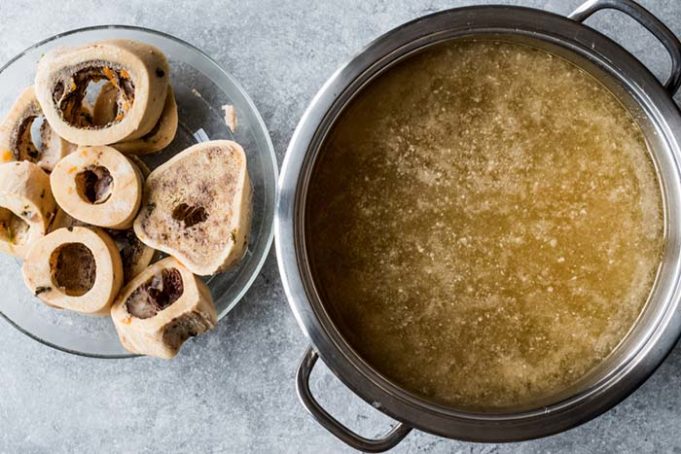Bone broth today has become one of the most popular foods to feed our dogs, especially in recent years since us owners have become aware of many health benefits it provides. This dish is simple and easy to make, although it does take time to prepare it properly. Let's talk about some of the health benefits of bone broth for dogs, how much to feed your pooch and how to make the best, most nutritious bone broth meal.
What Is Bone Broth?
Bone broth is a stock liquid from cooked or simmering raw bones. Other parts of an animal that can’t be eaten, like ligaments, marrow, tendons, skin and feet can also be added to the mix.
This is what bone broth looks like:
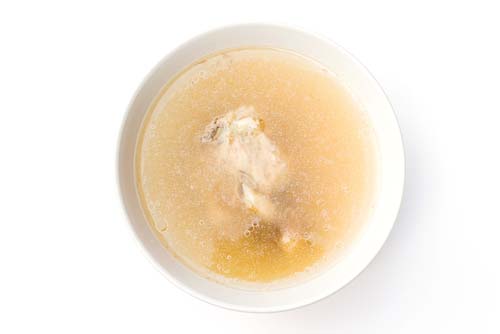
The key to making a good bone broth for dogs is to cook it for a long period of time at low heat. When you cook it long enough, the broth will suck up and be packed with more nutrients, vitamins, minerals and essential fatty acids.
You can also find two types of commercial bone broth: either pre-made broth made for people, often labeled as stock and found in your local grocery store, or a special bone broth made specifically for dogs. However, neither of these can compare to homemade bone broth for dogs since they are cooked for a shorter time at higher heat and are unlikely to contain as many nutrients. Commercial stock is also commonly “enriched” with chemicals, additives and unhealthy ingredients not suitable for dogs.
RELATED: 10 Most Common Dog Digestive Problems and How to Treat Them
Benefits of Bone Broth for Dogs
Bone broth is a simple dish to make, it is very inexpensive and, most importantly, it is very easy to digest and is packed with nutrients that are good for your pooch. This is the reason why bone broth is recommended for dogs with digestion issues (it's soothing on the stomach), as part of an elimination diet, dealing with food sensitivities and allergies, and more.
Bone broth is also considered superfood for humans in holistic Chinese medicine. After all, it is full of nutrients, particularly gelatin, which is especially helpful for people with joint issues.
1. Supports Digestion and Gut Health
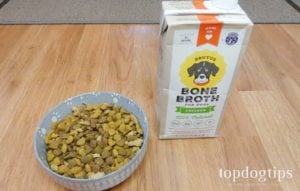 Dogs with digestive issues can benefit from bone broth because it helps to support a healthy gut and contains glycine and proline. Bone broth is often used to soothe symptoms of a leaky gut and even repair the damage to the colon tissue caused by this syndrome.
Dogs with digestive issues can benefit from bone broth because it helps to support a healthy gut and contains glycine and proline. Bone broth is often used to soothe symptoms of a leaky gut and even repair the damage to the colon tissue caused by this syndrome.
Glycine can protect the mucosa in the gastrointestinal tract against ulcers and restore the strength of the dog's gut lining. This amino acid can reduce inflammation in the gut and help dogs with food sensitivities.
Bone broth can also support the growth of good bacteria found in the gastrointestinal tract of dogs and humans.
2. Improves Joint Health
The health of your dog’s joints depends upon the health of the collagen in their ligaments and tendons, as well as on the ends of their bones. Bone broth is one of the best food sources of collagen/gelatin, which can help improve the state of the connective tissue around the bones.
Bone broth contains glucosamine too, which is a compound that protects joints. It is also full of other substances like hyaluronic acid and chondroitin that support joints’ strength, elasticity and flexibility. Your pooch will be able to move more smoothly and face less pain and irritation in his joints if you feed him bone broth regularly.
3. Helps the Liver Detox
The liver has a very important purpose as the main detoxification organ in a dog’s body, especially since dogs are prone to ingesting different toxins while they roll around in the grass treated with pesticides, lie on floors and carpets cleaned with chemicals, eat commercial food with unhealthy ingredients, etc.
Thanks to amino acid glycine that bone broth has in abundance, which improves the liver’s capacity to detoxify, your dog’s liver can be more effective in its job and get all the harmful substances out of his body faster.
4. Boosts the Immune System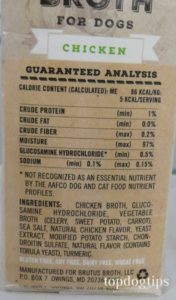
Bone broth can boost your dog’s immune system because it is full of essential minerals and vitamins like magnesium, calcium, phosphorus, sulfur, silicon. In addition to this, if you add a bit of bone broth to your dog’s water, he may be encouraged to drink more and stay hydrated better.
Bone broth is beneficial to the immune system because it can help reduce inflammation in your dog’s respiratory system and improve his ability to fight allergies and asthma.
Where to Buy Bone Broth for Dogs?
You can either buy dog bone broth (such as this brand that Samantha recently reviewed), or you can make it yourself, which is much cheaper and very easy to do, though it is time-consuming. We'll discuss a quick homemade bone broth for dogs recipe below in detailed steps, but if you prefer the convenience of store-bought brands, here are some of the best bone broth for dogs brands:
| Preview | Product | Rating | |
|---|---|---|---|

|
Native Pet Bone Broth for Dogs and Cats – Dog... | 1,598 Reviews | Check Price |

|
Brutus Beef Bone Broth for Dogs and Cats - All... | 2,993 Reviews | Check Price |

|
The Honest Kitchen Bone Broth POUR OVERS Wet... | 1,744 Reviews | Check Price |

|
Primalvore Grass-Fed Beef Bone Broth for Dogs... | 317 Reviews | Check Price |
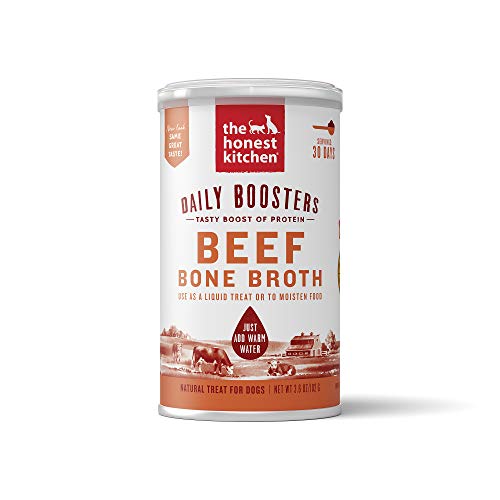
|
The Honest Kitchen Daily Boosts: Instant Beef Bone... | 6,892 Reviews | Check Price |
How to Make Homemade Bone Broth for Dogs
Making a bone broth is simple but it takes a lot of time. Another great thing about bone broth for dogs lies in the fact that you can add many ingredients to make it even more nutritious and tasteful. Of course, bones are the main ingredient but you can add various vegetables as well. Here are step-by-step instructions for making a tasty bone broth.
Step 1: Add Bones, Water and Vinegar
To make the best bone broth for dogs, you need a crockpot or a large stock pot so you can leave it cooking overnight. You can also use a regular pot but you need to be careful with it. Another smart option is using a large slow-cooker or pressure cooker.
Now, you got your crackpot ready – it’s time to add bones. You can add any type of bone, including chicken feet, lamb, duck or turkey necks, chicken frames, beef marrow bones, etc. Basically, you can use any bones you want, whether they are cooked or raw. However, raw bones are probably a better choice because they have all the nutrients still in them.
Once you add bones to your crockpot, cover them with water and add two-four tablespoons of apple cider vinegar, depending on the size of your crackpot. The vinegar serves to bring out minerals and other nutrients from the bones into the broth. You can substitute apple cider vinegar with regular vinegar or lemon juice.
Step 2: Add Vegetables
This is optional but you can make the broth even richer in healthy vitamins and minerals if you add some greens or other vegetables. For example, you can add parsley, kelp, oregano, dandelion greens, carrots, turmeric, kale, etc. You can also add raw liver.
However, make sure that anything you add is not harmful to dogs and don't be too generous like you would when making a meal for yourself. Avoid adding onions (or other toxic vegetables) to your dog’s bone broth. On the other hand, you can add a tiny bit of garlic. Although many people believe that garlic is toxic to dogs in any amount, this is actually a misconception. Garlic is safe and good for dogs in small amounts and can boost your dog’s immune system, help the liver with detoxification, keep bacterial, fungal and viral infections at bay, lower blood cholesterol and triglycerides, and even help in repelling ticks and fleas.
Once again, it is important not to go overboard with garlic because it can be toxic to dogs. Here are safe amounts of garlic you can give to your pooch per day:
10 to 15 pounds – 0.5 clove
20 to 40 pounds – 1 clove
45 to 70 pounds – 2 cloves
75 to 90 pounds – 2.5 cloves
100+ pounds – 3 cloves
Of course, your dog may not like the taste of garlic, in which case you should not try to force him to eat it.
Step 3: Let It Cook
Once everything is ready, turn the heat on high and let the broth boil. Once it boils, you can turn the heat down and let the broth simmer for at least 6 hours. Make sure to remove debris as it arises when you cook it.
After that, you should leave the broth to cook slowly overnight. It is best to leave the broth cooking for 24 hours if you used chicken bones, or 48 hours if you used beef bones.
Step 4: Let It Cool
Once the broth is done, let it cool off and you should notice a layer of fat forming on the top. Remove the fat if you want and you can serve the broth. Don’t skim the fat off before you are ready to serve the broth to your pooch. Also, don’t be surprised if there isn’t much fat on top, that doesn’t mean that your broth is not good.
Don’t forget to remove the bones from the broth when it cools off and before you let your dog eat it. You can also pick the meat off the bones and feed them to your dog separately or put the meat back in the broth.
Step 5: Store It Properly
Unless you are making bone broth for multiple dogs, you will probably have a lot of it left once your dog is finished with his meal.
You can keep the broth in the fridge for 3-4 days, or you can freeze it and serve it at a later date.
How Much Bone Broth to Serve Your Dog
 If your pooch never had bone broth before, you should start him off with a very small amount to see how he reacts and then, if there are no side effects and the dog enjoys it, slowly increase the dosage each time you feed your pup bone broth.
If your pooch never had bone broth before, you should start him off with a very small amount to see how he reacts and then, if there are no side effects and the dog enjoys it, slowly increase the dosage each time you feed your pup bone broth.
For starters, feed them about 4 to 8 ounces a few times per week. Pay attention to any signs of digestive problems, especially diarrhea. If your dog doesn’t have a bad reaction to bone broth, you can increase to serving to four to eight ounces per day, depending on your dog’s size. It is recommended to stick to one ounce per 10 of body weight.
Bone broth is one of the most nutritious foods while also very low in calories. It has many health benefits since it can help with digestion, boost your dog’s immune system, keep his joints healthy and make his liver more effective.
READ NEXT: What Can I Give My Dog for Diarrhea?
Disclosure: We may earn affiliate commissions at no cost to you from the links on this page. This did not affect our assessment of products. Read more here and find full disclosure here.


